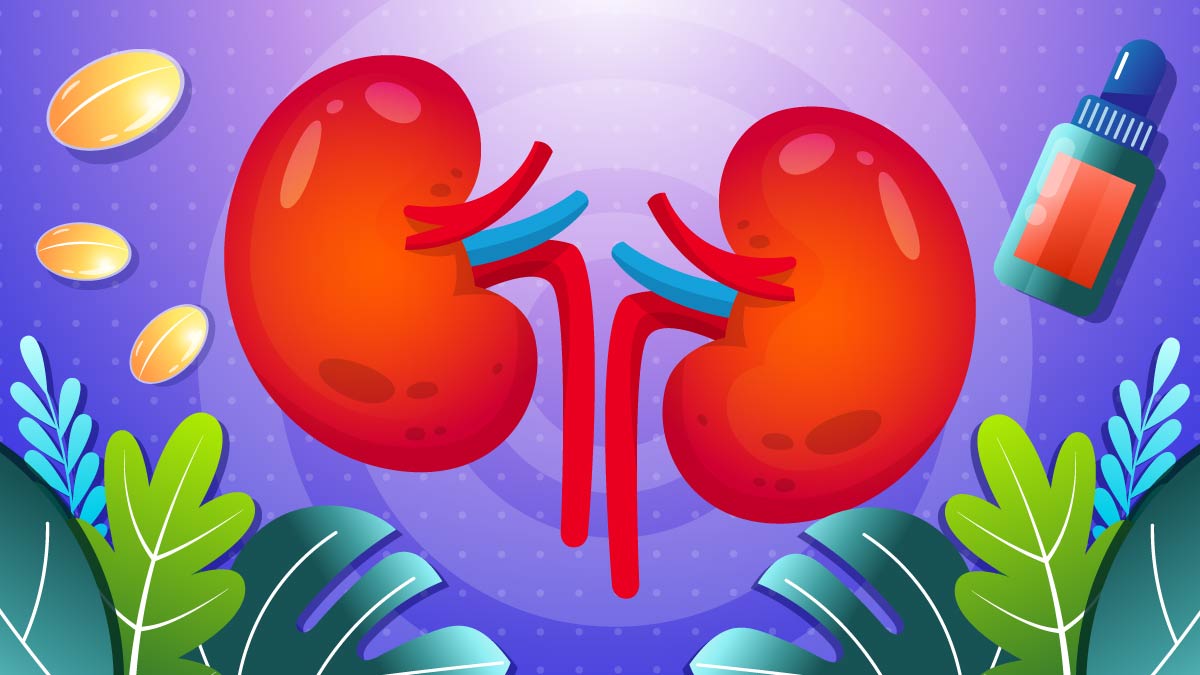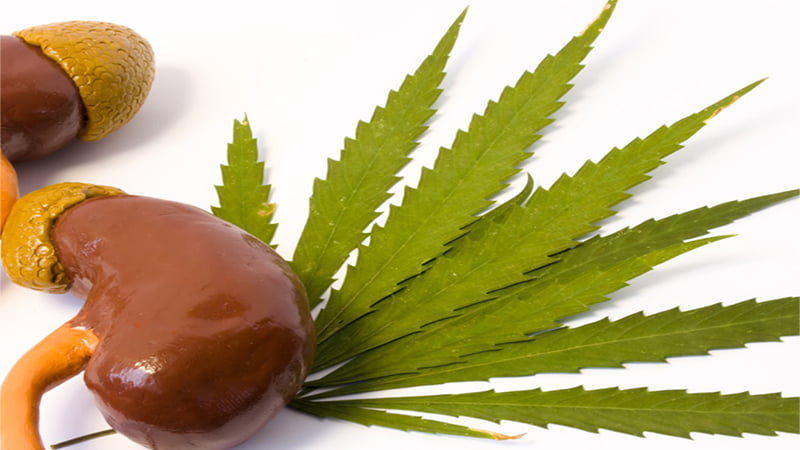CBD and Kidney Disease: Benefits, Dosage, and Side Effects

The kidneys are an essential organ that filters the blood and removes toxins from our bodies. In order for our kidneys to function properly, they need a steady supply of water and nutrients. When the kidneys don’t receive these substances, complications like kidney disease may happen.
With more and more people becoming aware of the effects of kidney disease on the human body, studies are now being conducted to find possible treatments for it.
And one substance that researchers find promising is CBD oil. A non-psychoactive cannabinoid derived from hemp plants, CBD may be beneficial in treating some symptoms associated with kidney diseases, such as inflammation or pain.
This blog post will explore how CBD oil works against kidney disease and what research has been done on this topic so far.
What Is Kidney Disease?
Kidney disease, also known as kidney failure, is a condition where the kidneys are not able to remove waste and excess water from the body. When a person is diagnosed with kidney disease, high levels of fluid, electrolytes, or toxins may be found in the blood, leading to other health conditions, like heart problems, anemia, bone loss, and other serious health consequences.
According to the National Kidney Foundation, this debilitating condition affects about 37 million people in the United States alone. And what’s worse is that about 90% of those with this condition don’t even know they have it.
Kidney disease may manifest in various forms. But the most common ones are:
- Chronic Kidney Disease – It is a long-term condition that is commonly caused by high blood pressure. When there is high blood pressure in the kidneys, more pressure is also asserted on the glomeruli – the tiny blood vessels found in the kidneys where blood is filtered and cleaned. Increased pressure on these vessels may result in damage to the kidneys and a decline in kidney function.
- Glomerulonephritis – This condition is a result of inflammation in the glomeruli. It is caused by congenital defects and improper use of drugs, but it can also be caused by infections. Unlike other forms of kidney disease, it usually gets better on its own.
- Urinary Tract Infection – This is a form of kidney disease caused by a bacterial infection in the urinary system. While it can be easily treated, if ignored for long periods, it can spread to the kidneys and result in kidney failure.
- Kidney Stones – Another common kidney problem, kidney stones form when minerals in the blood start to crystallize in the kidneys, forming stone-like solid masses. These stones can be released during urination, but the process of releasing them can be painful.
Treatment for kidney disease may include dialysis (where your blood is filtered and cleaned outside of your body using a machine), peritoneal dialysis (where fluids move through your abdomen), erythropoietin therapy (a medication that stimulates red cells production), or transplantation surgery.
What Causes Kidney Disease?
The kidneys help regulate the blood pressure and filter waste materials that enter the bloodstream. Our kidneys are quite precise in eliminating waste as they filter on a microscopic level. The functional unit that is responsible for all the filtration processes is called the nephron.
In every kidney, about 1 million nephrons work, pulling foreign compounds out from the bloodstream. In a day, around 180 liters of blood is being filtered by the kidneys.
While these nephrons do a great job at filtering unwanted foreign compounds, they are generally very sensitive. They can easily get damaged if toxic compounds are detected in the blood. For instance, in the case of a diabetic, blood sugar levels are often high, and the tissues in their bodies can easily get damaged, including the very sensitive nephrons.
When these nephrons become damaged, more strain is added onto the remaining nephrons, further putting them at risk of more damage.
What Are the Symptoms of Kidney Disease?

It’s not always easy to identify what kidney disease can do to you. In fact, it is so hard because the symptoms are often vague and might seem unrelated. There are a few telltale signs, however, that indicate a problem. Some are:
- Loss of appetite
- Chronic pain
- Extreme fatigue
- Muscle cramps
- Sleep problems
- Foamy urine
- Hypertension
- Darkened skin
- Lack of concentration
- Swelling in the wrists or abdomen
- Swelling of ankles and feet
How to Diagnose Kidney Disease
Kidney disease is diagnosed by performing different tests and scans. To test whether the kidneys are normal or not, the hallmark sign, estimated glomerular filtration rate (eGFR), is used. This metric refers to the volume of fluid that can pass through the kidney. If the value is low, it means that the kidneys are not fully functioning.
Aside from checking the eGFR values, the common procedures and tests that are generally performed to know the severity of kidney disease include:
- Blood Test – Waste product levels in the blood are examined in this test.
- Imaging Test – Doctors may use ultrasound devices to check the size and structure of a patient’s kidneys.
- Urine Test – Urine samples are often needed to check if there are abnormalities in your urine that can lead to chronic kidney failure.
- Kidney Biopsy – In this test, a sample of kidney tissue may be asked from the patient. The process may involve the use of local anesthesia using a long, thin needle that is inserted through the skin and into the kidney.
CBD: A Potential Treatment Option for Kidney Disease
The patient population for kidney disease is large. If you are one of these patients or you happen to know one, it’s quite a relief to know other treatment options are being studied today that may be able to help slow or even reverse the disease.
One of these treatments involves the use of CBD oil as an alternative form of medication for kidney disease symptoms like pain and inflammation. Though research on this subject is still at preliminary stages, there is a lot of potential for this treatment.
Let’s find out more about how CBD can potentially help with kidney disease in the succeeding sections.
Can CBD Oil Really Help with Kidney Disease?
Once the kidneys fail, it means that they have already stopped working and that the person may need a kidney transplant or regular dialysis to survive. Although these treatment options are beneficial for survival, they, too, have adverse side effects.
At this point, many of you may ask: what about CBD oil for kidney disease? To date, there are no studies that can attest to the effect of using CBD oil on our kidney health. But there are limited published studies that focus on the effects of cannabis on kidneys.
According to one study, cannabis may have promising effects when used as a treatment for the symptoms of advanced CKD and end-stage renal disease. Based on the study, some patients with CKD have used CBD to treat chronic symptoms like nausea, anorexia, anxiety, and pain. It is worth noting, though, that CBD oil has not been proven to prevent or treat chronic kidney disease itself.
Is It Safe for Patients with Kidney Disease to Use CBD?
Though more tests need to be done, CBD is generally considered a relatively benign substance. No reports have been recorded about the dangers that CBD poses among patients with kidney disease as well.
CBD is just released from the body via the fecal route, and it does not even involve so much kidney interaction. The only side effects known to be associated with CBD use are diarrhea, loss of appetite, to name a few.
CBD vs. Kidney Disease Symptoms

Kidney disease has no established cure. Therefore, the treatment often focuses on the symptoms. This is where CBD comes into the picture.
Based on recent medical studies, the possible health benefits of CBD may overlap with the symptoms of kidney disease in some ways. Let’s discuss some of them below.
Reduced Inflammation
Some forms of kidney disease, like pyelonephritis and glomerulonephritis, lead to kidney inflammation. And while some studies reveal that CBD may have anti-inflammatory properties, they were done on patients with multiple sclerosis. Other studies were performed on rats with sciatic nerve inflammation. This means more studies need to be done to identify the real impact of CBD on kidney inflammation.
Here’s a more recent study that looked into the potential of CBD for inflammation. Using an animal model, researchers explored if CBD can reduce cytokine storms and treat acute respiratory disease syndrome (ARDS). It was then found that the substance may reduce cytokine storms, protect pulmonary tissues, and promote inflammatory homeostasis.
Pain Management
There’s a lot of pain involved in kidney disease. It could be caused by kidney inflammation, urinary tract infection, or kidney stones. Research shows that CBD has promising abilities to reduce pain caused by arthritis, chronic pain, and surgical incisions. That explains why some are considering this substance as a treatment option, too.
Loss of Appetite
Another common symptom of kidney disease is loss of appetite. When left untreated, it can lead to dangerous weight loss or unwanted weight gain.
In an animal test performed on rats, it was found that CBD may help regulate appetite. The subjects of the study experienced a loss of unwanted body weight. But in any case, this animal test does not translate to human results. Some kidney disease patients, though, have considered CBD as a treatment for their loss of appetite as there are also claims that CBD is a moderate appetite stimulant.
Mood Management
CBD may help boost your body’s anandamide levels once they drop. A study in 2012 found that CBD may enhance the signaling of anandamide – a naturally occurring acid derivative that plays a significant role in mood management, memory, and appetite.
Experts also believe that CBD may have a positive effect on the brain’s serotonin receptors, which are responsible for regulating mood and physiological processes like vomiting.
Now, while there is not enough evidence that shows CBD may boost the brain’s serotonin levels, experts report that it may affect how the brain’s chemical receptors react to the existing serotonin hormones in the system.
Preclinical studies also suggest that CBD may modulate the brain’s GABA levels. GABA plays a role in how humans perceive fear, stress, and anxiety, slowing or blocking nerve signals in the brain. This shows that CBD helps to relieve patients’ anxiety and stress by regulating their moods and emotions.
In the study, mice were exposed to an infection that affected the balance between glutamate and GABA levels. With the introduction of CBD, the glutamate and GABA balance was restored and normalized.
CBD Oil Dosage for Kidney Disease
We’ve mentioned that several studies have been performed to deal with the symptoms of kidney disease. But before you consider using CBD oil for treating them, take note that kidney disease is a serious condition. Therefore, any potential treatment option must first be discussed with a doctor.
The thing with CBD oil is that it can be challenging to find the correct dosage because its components may have varying effects on the human body. And unfortunately, there is no study or research to date that can prove the effectiveness of CBD oil for kidney disease. So far, only animal testing and experiments have been done to explore the effects of CBD on the kidney.
Still, there are people with kidney disease who are using CBD oil along with other lifestyle changes and medications. As for the dosage, they are using existing dosage information from similar conditions like liver disease. These conditions may require higher doses of CBD oil for the effects to show.
In a report by the World Health Organization, it was stated that in clinical trials and research, CBD is generally administered orally in 100 to 800 mg dosage per day. This can be challenging for patients with kidney disease because they need to calculate the exact amount of CBD per milliliter of oil. This becomes even more challenging because CBD oils come in different concentrations.
If you plan to use CBD for kidney disease, we suggest that you begin with a small dose. As your body gets accustomed to it, you will know its effects on your body. By then, you can gradually increase your dosage. Again, because of the uncertainties about the proper dosage, patients are strongly advised to talk to their doctors first.
As a general rule of thumb, it’s best to start with 2–5 mg of CBD for every 10 pounds of your body weight.
Summarizing the Health Benefits of CBD Oil for Kidney Disease
Due to the limited treatment options for patients with kidney disease, it’s not surprising why therapeutic alternatives like CBD are in high demand. And despite the lack of research on the use of CBD for kidney disease symptom management, many are willing to take the risk and start experimenting with CBD.
Although CBD is now widely used in various health conditions, its efficacy with kidney disease is still being researched. So, while studies are ongoing, consult with a professional first before you decide to use CBD oil for kidney disease.
What are your thoughts on using CBD oil for kidney disease? Let us know your thoughts in the comments!
References:
- Kidney disease: The basics. National Kidney Foundation. (2021, May 20). Retrieved October 12, 2021, from https://www.kidney.org/sites/default/files/web_kidneybasics_v4.pdf [1]
- Rein, Joshua L. The nephrologist’s guide to cannabis and cannabinoids, Current Opinion in Nephrology and Hypertension: March 2020 – Volume 29 – Issue 2 – p 248-257 doi: 10.1097/MNH.0000000000000590 [2]
- Ho, C., Martinusen, D., & Lo, C. (2019). A Review of Cannabis in Chronic Kidney Disease Symptom Management. Canadian journal of kidney health and disease, 6, 2054358119828391. https://doi.org/10.1177/2054358119828391 [3]
- Khodadadi, H., Salles, É. L., Jarrahi, A., Chibane, F., Costigliola, V., Yu, J. C., Vaibhav, K., Hess, D. C., Dhandapani, K. M., & Baban, B. (2020). Cannabidiol Modulates Cytokine Storm in Acute Respiratory Distress Syndrome Induced by Simulated Viral Infection Using Synthetic RNA. Cannabis and cannabinoid research, 5(3), 197–201. https://doi.org/10.1089/can.2020.0043 [4]
- Argueta, D. A., Ventura, C. M., Kiven, S., Sagi, V., & Gupta, K. (2020). A Balanced Approach for Cannabidiol Use in Chronic Pain. Frontiers in pharmacology, 11, 561. https://doi.org/10.3389/fphar.2020.00561 [5]
- Ignatowska-Jankowska, B., Jankowski, M. M., & Swiergiel, A. H. (2011). Cannabidiol decreases body weight gain in rats: involvement of CB2 receptors. Neuroscience letters, 490(1), 82–84. https://doi.org/10.1016/j.neulet.2010.12.031 [6]
- Leweke, F. M., Piomelli, D., Pahlisch, F., Muhl, D., Gerth, C. W., Hoyer, C., Klosterkötter, J., Hellmich, M., & Koethe, D. (2012). Cannabidiol enhances anandamide signaling and alleviates psychotic symptoms of schizophrenia. Translational psychiatry, 2(3), e94. https://doi.org/10.1038/tp.2012.15 [7]
- de Mello Schier, A. R., de Oliveira Ribeiro, N. P., Coutinho, D. S., Machado, S., Arias-Carrión, O., Crippa, J. A., Zuardi, A. W., Nardi, A. E., & Silva, A. C. (2014). Antidepressant-like and anxiolytic-like effects of cannabidiol: a chemical compound of Cannabis sativa. CNS & neurological disorders drug targets, 13(6), 953–960. https://doi.org/10.2174/1871527313666140612114838 [8]
- Osborne, A. L., Solowij, N., Babic, I., Lum, J. S., Newell, K. A., Huang, X. F., & Weston-Green, K. (2019). Effect of cannabidiol on endocannabinoid, glutamatergic and GABAergic signalling markers in male offspring of a maternal immune activation (poly I:C) model relevant to schizophrenia. Progress in neuro-psychopharmacology & biological psychiatry, 95, 109666. https://doi.org/10.1016/j.pnpbp.2019.109666 [9]
- World Health Organization. (2018). CANNABIDIOL (CBD).